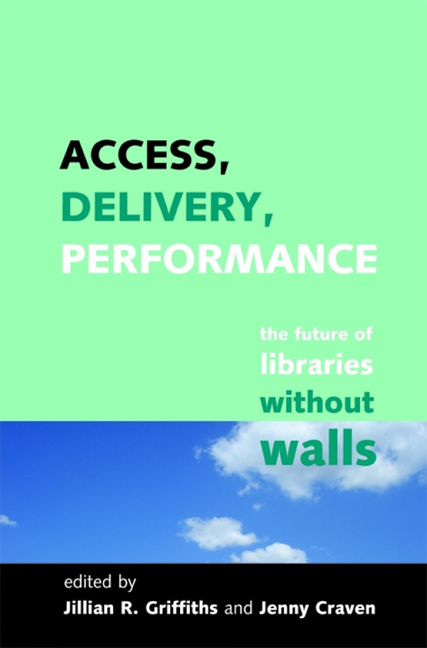Book contents
- Frontmatter
- Contents
- Contributors
- 1 Introduction
- 2 The Library Research Unit at the University of Lancaster, 1967–1972: a memoir
- Theme 1 Libraries, learning and distance learning
- Theme 2 Widening access to information
- Theme 3 Changing directions of information delivery
- Theme 4 Performance, quality and leadership
- 10 An evaluation decision-making system: development and implementation of a web-based evaluation learning and instructional tool
- 11 Measuring the quality of academic library electronic services and resources
- 12 Influential leadership for academic libraries
- Peter Brophy: a selected bibliography
- Index
11 - Measuring the quality of academic library electronic services and resources
from Theme 4 - Performance, quality and leadership
Published online by Cambridge University Press: 08 June 2018
- Frontmatter
- Contents
- Contributors
- 1 Introduction
- 2 The Library Research Unit at the University of Lancaster, 1967–1972: a memoir
- Theme 1 Libraries, learning and distance learning
- Theme 2 Widening access to information
- Theme 3 Changing directions of information delivery
- Theme 4 Performance, quality and leadership
- 10 An evaluation decision-making system: development and implementation of a web-based evaluation learning and instructional tool
- 11 Measuring the quality of academic library electronic services and resources
- 12 Influential leadership for academic libraries
- Peter Brophy: a selected bibliography
- Index
Summary
Introduction
Walk into any lecture theatre in a UK higher education institution and ask what students use to find information and the majority will shout ‘Google’ – a situation we refer to as the ‘Googling phenomenon’ (Griffiths and Brophy, 2005). Students’ use of search engines influences their perception and expectations of all electronic resources but, although the preference for very simple search engine approaches is prevalent, it does not mean that students are necessarily best served by this approach. Exclusive use of any commercial search engine, coupled with a lack of awareness and understanding of peer-reviewed, quality resources, is not in the best interest of students or academic staff.
This issue of ‘quality’ plays a key role in professional discussions regarding electronic (and other) services and resources and as a result sophisticated approaches to quality assurance have been developed, such as peer review (largely for journal articles) and publisher reputation (for monographs) and relating these to the known interests of the user community, present and future. As a profession we are constantly striving to ensure that we provide the best services and resources possible to our users and this concern has resulted in a myriad of approaches and methods being used in an attempt to establish the quality of services and resources and lead to improvements in them. Online resources in particular have been the focus of much research in recent years, with work being undertaken in many areas including, for example, information retrieval, information-seeking behaviour and usability studies.
Evaluation of comparative online systems, services and resources has a long tradition of improving the state of the art in information retrieval (IR) technology. The criterion for the evaluation of performance effectiveness has largely been based on the overall goal of a retrieval system, that is, the retrieval of relevant documents and suppression of non-relevant items. Such evaluations adopt the Cranfield experimental model based on relevance, a value judgement on retrieved items, to calculate recall and precision. These dual measures are then presented together where recall is a measure of effectiveness in retrieving all the sought information and precision assesses the accuracy of the search.
- Type
- Chapter
- Information
- Access, Delivery, PerformanceThe Future of Libraries Without Walls, pp. 183 - 196Publisher: FacetPrint publication year: 2008



